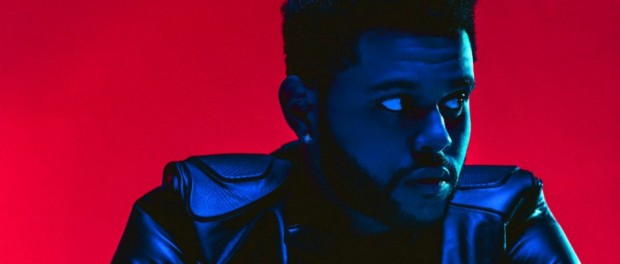The Weeknd – Starboy

Late 2012, gambling on The Weeknd’s Trilogy was the best ten quid I’ve ever spent – swear to god, the BEST. It felt like a long-shot; I’m generally no RnB fan, but soon Abel Tesfaye’s languid, soulful, grimy sound-world was pouring from the speakers day-after-day, a long while since I’d been this possessed. I became a willing evangelist to anyone who might listen. The three mixtapes making up the set presented the year’s most original sound, word and style: an omnivorous musicality slaved to a coherent and sustained vision – this music snagged hip hop’s darker vibes; drew on the hauntology end of electronica; stole from indie and goth; toyed with techno. Vocally, Tesfaye had a talent for drawing fully-fleshed portraits of a life lived darkly with his powerful voice the sugar letting it sink in deep.
It was refreshing, and increasingly rare, to find an artist devoting sweat to the art of crafting true narrative rather than merely wedging one-liners and hashtags together in a diuretic stew. As an example of how much had gone into the images and stories, try this stretch from Echoes Of Silence highlight ‘The Host’: “Cus these nights pass, so much quicker then the days did, Same clothes you ain’t ready for your dayshift, But you up you need money for ya’ facelift…Another room, you hear your mom cryin’, cause she found your bag stuffed in the laundry and the Bacardi from the last party.” This was an artist at such a peak of confidence he could rip into Michael Jackson’s ‘Dirty Diana’, sheering away the silky smoothness of the original to show the titanium hard sentiments at its heart.
Major label follow-up, Kissland, felt like a worthy successor: amid the dystopic drowning in hedonism, there was still genuine triumphal warmth in hearing one song confess “I was broken, I was so broke, I used to roam around the town when I was homeless;” a still young man rising from harsh circumstance beyond most listeners’ imaginings trying to find his feet now he bestrode a world stage. 2015’s Beauty Behind The Madness, however, put the artistic choices open to Tesfaye on full display: half the album remained wedded to the shadowy dipsomanic indulgences of previous records, while other tracks brought in mainstream friendly collaborators, danceable beats, cleaner chart-friendly production. It was still a successful blend: ‘Can’t Feel My Face’, famously, turned drug sensation into a global anthem while the late album run of ‘Dark Times’, ‘Prisoner’ and ‘Angel’ spoke to a new maturity.
Which brings us to Starboy. The Weeknd’s new album resolves the questions left open by its predecessor’s split personality. It’s a perverse and disappointing answer, to trade hard-won credibility and respect for the plasticity, depthlessness and ubiquitous irrelevance of the average reality TV forgettable. It’s rare to encounter an album this determined to erase the personality and individuality of its featured artist. The only people praising this album will be the models, financiers, managers lounging in Tesfaye’s exclusive hotel suite and in need of suitably anonymous background muzak. This is a failure on at least three crucial levels.
Firstly, letting pop hit writers into the room has had the desired effect: this is an album of standard-issue lyrics, generic writing for hire, words that could be sung by anyone at all but about no one at all. Barely a single line connects visually or emotionally; “We could just be rocking”? “Paint me a picture with your true colours”? “I’m a muthafucking starboy”? These are stultifyingly dull lines. Tesfaye, until now, has sung words that come alive in the mind – the words here say nothing and show less. There’s no life in these lines; this album takes a uniquely confessional and cinematic artist and makes him spit someone else’s leftovers – no wonder he sounds half-asleep. Kendrick Lamar, in stark contrast to the ‘emoting by committee’ norm here, turns in a verse of tongue-twisting dexterity worthy both of deep consideration and repeat listening – the best lyrical fire (and the finest single minute) on the entire album.
Second issue: having robbed Tesfaye of the lyricism that made him unique, having let Lamar murder The Weeknd on his own shit, further effort has been devoted to making Tesfaye sound like a karaoke turn. Reanimating the words of Michael Jackson for a genuinely stunning cover four years ago – that was a stroke of brilliance; flogging a one-note impersonation, based on a single piece of Jackson’s versatile vocal palette, for an entire album makes Tesfaye sound zombified. It exposes how misplaced comparisons always were. Jackson was a once-in-a-generation talent, the most innovative dancer of the entire pop era and one of its most talented singers. Tesfaye, relative to Jackson, has a far more limited range, but one that was always enlivened by being combined with his lyrical excellence. It certainly doesn’t excuse the glutinous schlock of auto-tune ladled over numerous songs to try and fake drama.
Third problem: the music. This record is a bouncy, bubbly blur of club-tickling beats and slobbering eighties synthesisers. It’s gaudy, gross and – worse – uninteresting. Having effortlessly straddled so many musical worlds, everything here comes in just two tones: lounge music for pseudo-celebrities or house jams for champagne kids on gap years – there’s a determination to eradicate the lo-fi dirt and street-streaked shade that always fit The Weeknd’s words so well. The much vaunted presence of Daft Punk does create two noticeable backdrops but not without reservations. The skittering beats and sombre piano on ‘Starboy’ fit Tesfaye like a glove, but ‘I Feel It Coming’ simply reinforces the grave-robbing vibe with its phony 1983 feel-good anthem, further marred by robo-voices. Too many songs wind up as cheap keyboard pre-sets played at plodding mid-tempo (late album cut ‘Die For You’ is like synthesised oompa music while ‘Sidewalks’ has orgasm noises buried in the mix, but even that can’t raise the energy here).
That’s what’s most upsetting. There’s nothing I could say that would be as insulting to The Weeknd as what has been done to him under his name. The people responsible for this album have so little respect for his abilities that they’ve decided to erase him, anaesthetise him, delete him entirely. It’s tellingly disingenuous when Tesfaye snarls “I just won a new award for a kids show…God damn bitch I am not a teen choice,” when this album is squarely aimed at the musical taste-buds of teeny-boppers and those yet to grow out of Nickelodeon – this isn’t an album for adults. To add to the injury, there’s something faintly ridiculous about trying to capture a mainstream that exploded a decade-and-a-half ago by faking the sound of music that passed its sell-by-date three decades ago. In the end, if management wanted a generic RnB singer then there are dozens to choose from, did they have to neuter The Weeknd to add one more?
Sure, there are recoverable moments: the Daft Punk tracks sort of pass muster; ‘False Alarm’ has a compulsive energy; there’s a late rally between tracks ten and sixteen. But there’s far more to wince at, not least the graceless aping of Cyndi Lauper on the nonsense of ‘True Colors’. The Weeknd was an excellent album artist who seemed to understand that coherent album statements create a virtuous circle of enduring critical praise and acclaim which grants artists enhanced longevity. Starboy is a throwback to the late CD-era when some people decided there was no point to albums so they just needed to fling music randomly onto a disc in full expectation that no one would buy more than a few songs. It was always a self-fulfilling prophesy announcing to the audience that even the artist didn’t care about the album so why should they? Even without its flaws Starboy is way too long at 68 minutes and, at a time when musicians have rediscovered that the human attention span is about the length of a single vinyl LP and so many artists are showing the enduring power of the album (including Kendrick Lamar and, until now, The Weeknd), there’s no excuse.
A true artist has to mature, to change, if they’re to stay interested and interesting – Tesfaye couldn’t re-tread old ground forever. Nor does a shift to PG content necessitate a loss of emotional impact – he’s lived a life containing much worth telling. Meanwhile Beauty Behind The Madness had shown that Tesfaye could haunt the top reaches of the charts without selling his soul. But, on Starboy, Tesfaye has been robbed of the three strengths that, in combination, made him a world-class artist. The Weeknd was a package: it needed the strength of his voice, married to the genuinely exceptional nature of his writing, working within his uniquely crafted sound-world – all three parts working in unison, that’s when he could beat Jackson hands down. Starboy feels like a crisis of confidence, or of negotiating power, because not even one part of his tripod is allowed to stand unhindered.
Still, to keep it in perspective, The Weeknd’s public career from 2011-2016: three album-length mixtapes, three albums – that half-decade is already as long as Eminem’s imperial phase (Slim Shady ’99 to Encore 2004); as long as Public Enemy’s pomp (Bum Rush ’87 to Apocalypse ’91); it’s far longer than Lil Wayne’s spell at the top. Maybe it’s OK to admit we are witnessing an artist prove his mortality? I hope The Weeknd has more to offer. In the meantime, give it 5-10 years and people will still be buying those first three mixtapes and Tesfaye will fill venues based on their appeal. Starboy will join MC Hammer’s Too Legit To Quit in the bargain bin of albums no one will confess to having bought.
